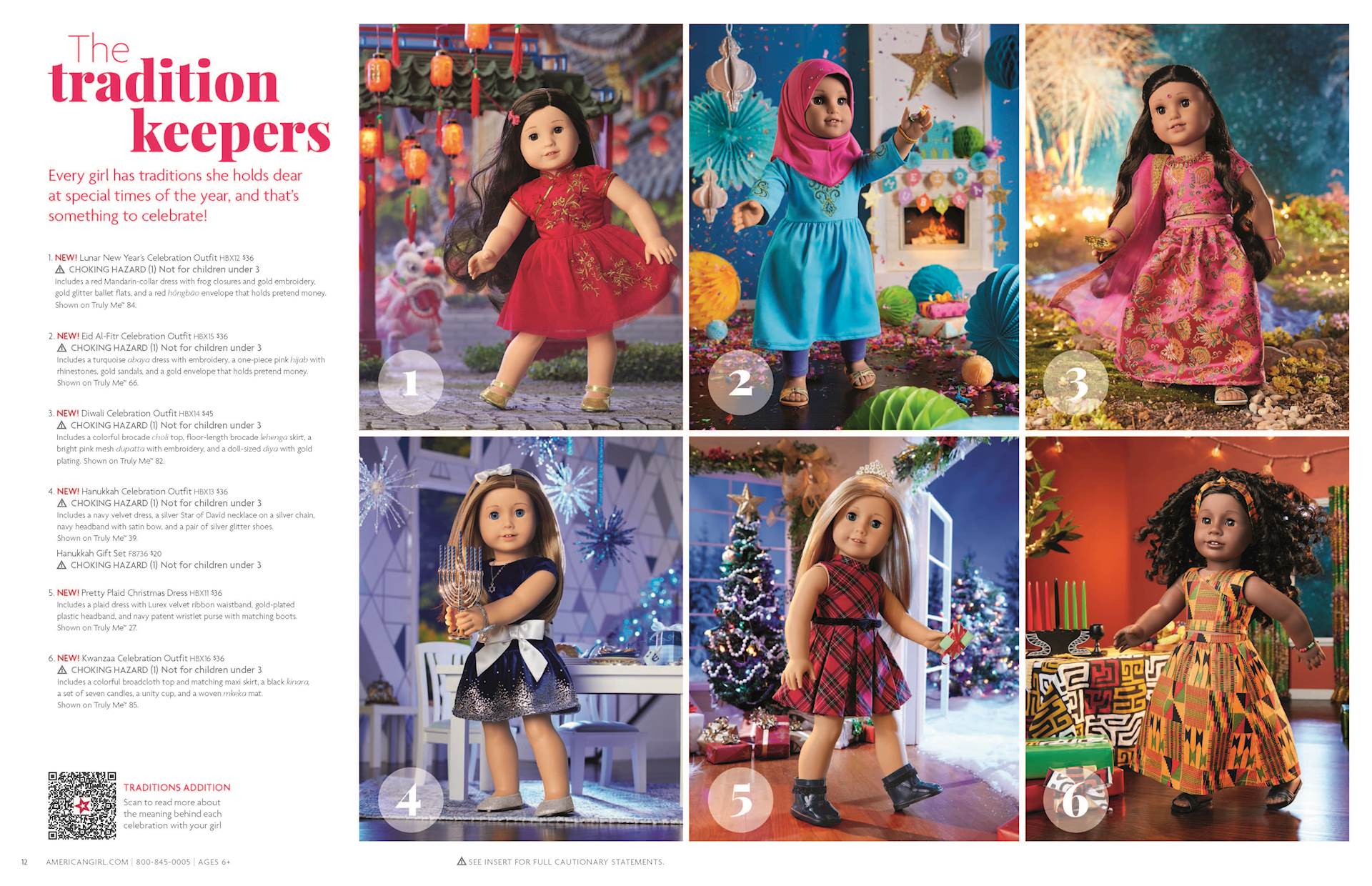A few weeks ago, the American Girl catalog landed in our mailbox. My nine-year-old was excited to see it (as always), and she grew even more excited as she flipped through and found a two-page spread with the heading “Tradition Keepers.” Here were six American Girl Dolls dressed in their holiday finest. Only one of them was wearing a Christmas dress. The other dolls wore fancy outfits to celebrate the Lunar New Year, Eid al-Fitr, Diwali, Hanukkah, and Kwanzaa. For my daughter, who struggles this time of year as the only Jewish child in her school, that photo spread was meaningful. She saw herself alongside these other “American Girls.” She is unique perhaps in her community, but these images tell her she belongs.

Image courtesy American Girl (December 2021) catalog. americangirl.com
The phrase “Happy Holidays” has emerged in recent decades as a gesture toward inclusivity. It is intended to provide a way to wish others well in this “holiday season” no matter their beliefs, values, or cultural identities. The phrase bothers some people. It seems to dilute and mask Christmas, which is among the two most sacred holidays for Christians. It may unnecessarily elevate Hanukkah, which is a minor Jewish holiday that recognizes the rededication of the Jewish temple in 165 B.C.E. (Before the Common Era), following the overthrow of the Greek occupation of Palestine. Kwanzaa is included in this list of seasonal holidays with little attention given to the context of police violence and structural racism in which this African American holiday was created in 1966.
It may be worth asking if this well-meaning phrase “happy holidays” actually fosters belonging, or if, instead, it allows people to gloss over differences with only the most cursory nod to what really matters to the individuals and communities that celebrate these various holidays.
I don’t have an answer to that question. What keeps me up at night is not the way people greet me in December. What keeps me awake is the rise in anti-Semitic violence over the past six years. My family’s synagogue has installed major security features. Adults take turns guarding the entrance any time children are present. We are not alone in this sense of anxiety. Other religious minority communities and nonwhite racial and ethnic communities live in various states of unease and vigilance. In this time that we call “the holiday season,” the word “holidays” in the expression “Happy Holidays” may be less of a problem than the word “happy.”
What would it mean to approach this festive time of year from a trauma-informed perspective? How should we greet people and wish them well in a way that does not inflict harm?
Just last week the leaders of our Prevention team asked me exactly this question. It’s a worthwhile one.
One of my dearest friends says that the time between Thanksgiving and New Year’s Day is the MOST _____ time of the year.
The most stressful.
The most triggering.
The most binge eating and drinking.
The most disappointing after engaging in wishful thinking about one’s familial relationships.
Another friend tells me he spends every brain cell he has trying to stay sober between November 20 and January 2.
There is information out there about holidays and trauma. SAMHSA provides some useful observations about being trauma aware during this season. But as of now, there are no commonly accepted “best practices” for navigating holiday greetings in a trauma-informed way.
One gift we might give to our clients and patients, to each other, and to ourselves is to give this some thought. Perhaps we can create our own bank of trauma-informed expressions.
We already have a start.
When our Prevention leaders asked me about such greetings, they also provided a suggestion. Donna Nahlik recommends, “I wish you peace and joy this holiday season.”
When I asked a friend and fellow DEI officer, she offered, “Warm wishes during this holiday season.”
I know there are more possibilities, more ways for us to cultivate safety in this season. I invite you to add your own phrases and thoughts, as many as we can generate. Post your suggestions here in the comments section of the Chestnut blog.
Thinking of you all in this season of traditions,
Molly